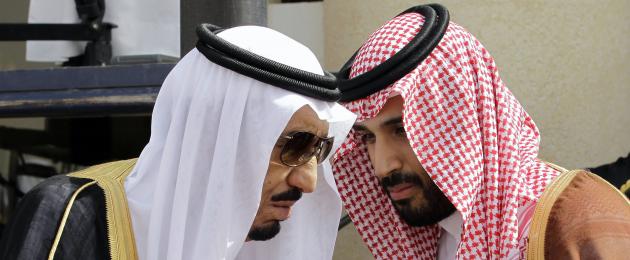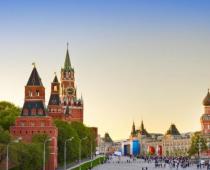Journalist Jamal Khashoggi disappeared in Istanbul in early October. He was last seen at the Consulate General of Saudi Arabia, where Khashoggi came to complete paperwork. Authorities later confirmed that the columnist was dead.
Former British intelligence chief John Sawyers all points to the murder of an opposition journalist ordered by Saudi Crown Prince Mohammed bin Salman Al Saud.
Photo © AP Photo/Alastair Grant
In total, two versions are being promoted in the world press regarding the death of Saudi journalist Jamal Khashoggi. According to one, the murder was committed on the orders of the second person in the state, Mohammed bin Salman, whom the journalist regularly criticized. According to another, “the death of the correspondent occurred as a result of his conflict with people who were also on the territory of the Saudi consulate in Istanbul.”
One of many
Not so long ago, just three and a half years ago, Mohammed bin Salman was simply one of the Saudi princes in the legendary expansive royal family. He, like many of his uncles and cousins, amused himself by playing business and betting on the stock market, and sometimes succumbed to the temptation to act as a philanthropist.
That all changed when his father, Salman bin Abdulaziz Al Saud, inherited the royal throne in January 2015. Muhammad emerged from the shadows and began to actively expand his powers, taking advantage of his position as the favorite son of the current king. Crushing all other relatives-competitors vying for power, and isolating from the world those who did not want to capitulate to it.

Photo © AP Photo/Hassan Ammar
The sonorous reformist speeches of the prince, who did not skimp on criticism of the order in the country, portrayed the prospects for Saudi Arabia to transform into a peninsula of real democracy within just a few months. Not only some segments of the country's population, but also Western leaders bought into Muhammad's reformist words.
The road to a father's heart
Mohammed bin Salman Al Saud was born in 1985, becoming the first child of Salman Sr.'s third and last wife, Fahda. The path to the throne for him was blocked by his brothers who were born earlier. But the road to the pope’s heart turned out to be clear, and Muhammad managed to pass it faster than others. However, there was a counter-movement here: among other equals, Salman, for a reason known only to him, chose Muhammad.
He was 12 years old when his father, then the head of the capital province, began taking him with him to meetings with businessmen and politicians. According to the official biography of Muhammad, at school he stood out for his intellect and was among the ten best graduates in the kingdom in the year of graduation.
Unlike many princes who went abroad for higher education, Mohammed chose to stay in Riyadh next to his father. He graduated from the Faculty of Law at King Saud University with second place in his course. They say he never smoked, drank alcohol and did not like to party. He took his first steps in business in real estate and the stock exchange. After which he showed philanthropic inclinations, allocating subsidies from his own MiSK foundation to support young entrepreneurs. This did not go unnoticed by the regional publication Forbes, which awarded the prince with its prize in 2013.
And to the pinnacle of power
Upon ascending the throne on January 23, 2015, Salman appointed his beloved son as Secretary General of the State Court and Minister of Defense - at 29 years old, he became the youngest head of the Defense Ministry in the country's history. On January 29, Mohammed bin Salman also became the head of the State Council for Economic Affairs and Development. The Council, it must be said, was created by Muhammad himself. On the same day. Instead of the Supreme Economic Council, which he himself abolished.
Muhammad, whom those around him began to call MBS for short, actively began to demonstrate his ambitions. True, the results of the military campaign he launched in Yemen against the Houthis turned out to be catastrophic, but not so much that the new Saudi authority became despondent. This was followed by a boycott of Qatar, an announcement of economic transformation “in order to reduce the country’s dependence on oil in the future,” and the proclamation of Saudi Arabia’s policy of abandoning radical Islam.
Foreign investors and young Saudis were delighted with the fresh air of change flowing into the country.
Sources claim that Mohammed's vigorous activity very soon caused discontent and ferment within the family: King Salman's nephew, 57-year-old Mohammed ibn Nayef, appointed crown prince in 2015, distributed a letter in which he criticized MBS for his arrogance and warned about what he was preparing palace coup. Despite the fact that Naif had intelligence and the Ministry of Internal Affairs at his disposal, the young rival managed to “shoot” first, depriving his older competitor of all portfolios in June 2017 and taking the post of crown prince.
On November 4, 2017, MBS became the head of the specially created Anti-Corruption Committee. Another episode that the West liked, where the fight against corruption, although not bringing the desired results, is on trend. On the same day, 11 princes (four of them were former ministers) and several dozen of the richest people in the kingdom were arrested. On suspicion of involvement in corruption.
Monster made in USA and the smart paranoid

Photo © AP Photo/Francois Mori
Bin Salman is a monster created by the USA. The Trump administration's support, especially his dealings with the president's son-in-law Jared Kushner, has been a critical factor in his advancement, said Adam Coogle, a watchdog at Human Rights Watch. - Before this, Mohammed ibn Nayef, respected by security services and the US military for his actions in the fight against terrorism, was considered Washington's man. Now these same services saw with caution the growth of the young and thoughtless prince. The news that Ibn Nayef was placed under house arrest shocked many in Washington and was seen as an insult.
David Ottaway of the American think tank Wilson also noted that the Khashoggi scandal has destroyed the image of a reformer carefully created by Mohammed bin Salman.
The Khashoggi scandal has undermined Mohammed bin Salman's image as a reformer previously praised by Western governments. His decisions to limit the power of the religious police, open cinemas and concert halls, and allow women to drive suddenly turned out to be child's play, designed to slightly retouch the ominous image of a tyrant who considers himself so above the laws that he can order the murder of a journalist who criticized him right in the consulate, he writes. David Ottaway of the Wilson Center of America.

Photo © AP Photo/Evan Vucci
Western politicians are very cautious in assessing the murder of an Arab journalist. On the one hand, “highly liked” makes it clear who the customer is. But on the other side stands Trump, who, under pressure from the public and the facts, although he admits that “there are a lot of unknowns in the case,” does not want to directly condemn MBS.
The French Foreign Minister vaguely says that “many questions remain unanswered” and “we need to carefully and comprehensively understand this matter.” And in a joint statement by the German Chancellor and the Minister of Foreign Affairs of the Republic, with restrained indignation, they reported “the insufficiency of information provided by Riyadh” and “the possibility of suspending arms supplies to Saudi Arabia while the investigation into the death of the journalist is underway.” Europe and US NATO comrades are unlikely to act contrary to Trump.

Illustration copyright Ronald Grant Image caption Prince Mohammed became defense minister at the age of 29
From the moment his father ascended the throne, things quickly went uphill for Prince Mohammed bin Salman - and now he...
He has more and more power. All its competitors faded into the background.
Here's what you need to know about the heir to the throne of Saudi Arabia.
Centralized power in his branch of the ruling family
The newly appointed prince was close to his father Salman even before he became king.
In 2009, Prince Mohammed became a special adviser to his father, who was then governor of Riyadh.
Still, Prince Mohammed's rise is unique in a kingdom unaccustomed to such meteoric political rise.
A big leap in his political career came in April 2015, when the new Saudi monarch removed the elderly heir to the throne and appointed a younger prince in his place.
Instead of the king's half-brother, Muqrin ibn Abdul Aziz, the monarch's nephew, Mohammed bin Nayef, was appointed crown prince.
And Salman’s son was appointed his deputy - and, accordingly, the heir of the second line. Now he, Mohammed bin Salman, has replaced bin Nayef in this position.
The new heir to the throne is also appointed Deputy Prime Minister and continues to serve as Minister of Defense.
Illustration copyright Getty Images Image caption US President Donald Trump meets with Prince Mohammed at the White HousePays great attention to defense
When Salman bin Abdulaziz became king in January 2015, he was quick to strengthen his son's position in the country's ruling elite.
At 29, Mohammed became the country's youngest defense minister.
Just two months later, Saudi Arabia assembled a coalition and launched a military campaign in Yemen.
However, to date, the coalition has not achieved its goal of helping exiled Yemeni President Abd-Rabbu Mansour Hadi retake the country's capital, Sanaa, from the control of Houthi rebels.
Wants to rid the Saudi Arabian economy of oil dependence
In April 2016, the powerful prince, who is also head of the Economic and Development Council, unveiled an ambitious vision for economic reforms aimed at ending the kingdom's dependence on oil revenues.
According to him, the implementation of this plan - Vision 2030 - will allow the country to “live without oil” by 2020.
Having entered the leading roles, the young prince began to position himself as a bright role model for the people of Saudi Arabia.
The International Monetary Fund called Vision 2030 an "ambitious, far-reaching goal" - but warned it would be difficult to achieve.
Illustration copyright Getty Images Image caption In April 2015, King Salman named his son crown prince.Doesn't want to change relations with Iran
Last month, Prince Mohammed ruled out any dialogue between Saudi Arabia and its rival Iran.
These countries are indirectly involved on opposite sides in two conflicts - in Syria and Yemen.
Relations between Riyadh and Tehran deteriorated further after Saudi authorities executed prominent Shiite cleric Nimr al-Nimr.
The rise of Mohammed bin Salman was regarded by the Iranian media as a “soft coup”.
Family man
Mohammed bin Salman was born on August 31, 1985, the eldest son of Salman's third wife, Fahda bint Fala.
Unlike most Saudi princes, he completed his education in Saudi Arabia.
He studied law at King Saud University and then worked in several government jobs.
He has only one wife, from her he has two sons and two daughters.
What future does the young heir have in store for the Arabian kingdom?
Mohammed bin Salman was announced as the heir to the throne (and therefore the future king) of Saudi Arabia only five months ago. And during this time, the 31-year-old son of the ruling king Salman bin Abdulaziz has already managed to loudly make himself known - both within the kingdom and outside its borders. His father will be 82 years old on December 31, and therefore experts do not rule out that Mohammed bin Salman will take the throne in the very near future. What are the consequences of the planned – and partly already carried out – transformations? How might US relations with Saudi Arabia, a traditional American ally in the Middle East, change? The orientalist, author of the book “Saudi Arabia. XXI century in the homeland of Islam" Konstantin DUDAREV.
Fight against corruption or for power?
Mohammed bin Salman is called a “dark horse” by some, but he has plenty of political experience. Eight years ago, he took the post of special adviser to the king - his father, and already in 2012 he became deputy minister of defense. Since January 2015, he headed the Royal Court and the Ministry of Defense of Saudi Arabia.
It is generally accepted that it was Mohammed bin Salman (or as he is sometimes called in the press, MBS) who was behind the kingdom’s active intervention in the affairs of other states. Thus, under him, Saudi Arabia began to fight the Houthi rebels in Yemen, who, according to Riyadh, are supported by the Saudis’ longtime enemy, Iran.
And several lawsuits have already been filed in court. They are still silent about them, but they are a time bomb. Even after the decision of Congress in 2016, the Saudis declared their readiness to withdraw their assets from the United States, exceeding $750 billion, if claims were opened. Riyadh also threatened to demand repayment of the debt - more than one hundred billion dollars. These are very serious threats, and they can disrupt all agreements reached. Although, of course, Saudi Arabia is extremely interested in American investments in the form of the latest technologies to implement the planned economic reforms.”
From the moment his father ascended the throne, things quickly went uphill for Prince Mohammed bin Salman - and now he finds himself one step away from the throne.
He has more and more power. All its competitors faded into the background.
Here's what you need to know about the heir to the throne of Saudi Arabia.
Centralized power in his branch of the ruling family
The newly appointed prince was close to his father Salman even before he became king.
In 2009, Prince Mohammed became a special adviser to his father, who was then governor of Riyadh.
Still, Prince Mohammed's rise is unique in a kingdom unaccustomed to such meteoric political rise.
A big leap in his political career came in April 2015, when the new Saudi monarch removed the elderly heir to the throne and appointed a younger prince in his place.
Instead of the king's half-brother, Muqrin ibn Abdul Aziz, the monarch's nephew, Mohammed bin Nayef, was appointed crown prince.
And Salman’s son was appointed his deputy - and, accordingly, the heir of the second line. Now he, Mohammed bin Salman, has replaced bin Nayef in this position.
The new heir to the throne is also appointed Deputy Prime Minister and continues to serve as Minister of Defense.
US President Donald Trump meets with Prince Mohammed at the White House
Pays great attention to defense
When Salman bin Abdulaziz became king in January 2015, he was quick to strengthen his son's position in the country's ruling elite.
At 29, Mohammed became the country's youngest defense minister.
Just two months later, Saudi Arabia assembled a coalition and launched a military campaign in Yemen.
However, to date, the coalition has not achieved its goal of helping exiled Yemeni President Abd-Rabbu Mansour Hadi retake the country's capital, Sanaa, from the control of Houthi rebels.
Wants to rid the Saudi Arabian economy of oil dependence
In April 2016, the powerful prince, who is also head of the Economic and Development Council, unveiled an ambitious vision for economic reforms aimed at ending the kingdom's dependence on oil revenues.
According to him, the implementation of this plan - Vision 2030 - will allow the country to “live without oil” by 2020.
Having entered the leading roles, the young prince began to position himself as a bright role model for the people of Saudi Arabia.
The International Monetary Fund called Vision 2030 an "ambitious, far-reaching goal" - but warned it would be difficult to achieve.
Saudi Prince Mohammed bin SalmanIllustration copyrightGETTY IMAGES
Image caption
In April 2015, King Salman named his son crown prince.
Doesn't want to change relations with Iran
Last month, Prince Mohammed ruled out any dialogue between Saudi Arabia and its rival Iran.
These countries are indirectly involved on opposite sides in two conflicts - in Syria and Yemen.
Relations between Riyadh and Tehran deteriorated further after Saudi authorities executed prominent Shiite cleric Nimr al-Nimr.
The rise of Mohammed bin Salman was regarded by the Iranian media as a “soft coup”.
Iranian military blames Saudi Arabia for attacks in Tehran
Family man
Mohammed bin Salman was born on August 31, 1985, the eldest son of Salman's third wife, Fahda bint Fala.
Unlike most Saudi princes, he completed his education in Saudi Arabia.
He studied law at King Saud University and then worked in several government jobs.
He has only one wife, from her he has two sons and two daughters.
Crown Prince of Saudi Arabia Mohammed bin Salman Al Saudstands out as the youngest face of a young nation.
However, dark stories follow the son of the head of the royal family. Conflict with Iran, pressure on businessmen and human rights activists. Now there is suspicion of the murder of journalist Jamal Khashoggi, who wrote several columns for the Washington Post criticizing Prince Mohammed and disappeared on October 2 while visiting the Saudi consulate in Istanbul.
Turkish officials have not provided any evidence but say the journalist was killed and dismembered by a 15-member Saudi team. An operation that, if carried out, had to be approved by the top of the Al-Saud monarchy. The kingdom's administration has described the claim as "unsubstantiated" but has provided no evidence that Khashoggi ever left the consulate.
Growing up of the heir
For decades in Saudi Arabia, succession took place among the dozens of sons of King Abdul Aziz, the founder of the dynasty. And over time, the sons grew older and older, reaching the throne.

When King Salman took power in January 2015 and quickly appointed Prince Mohammed as defense minister, he took the kingdom by surprise, especially given the importance of the position and the prince's age.
As defense minister, he entered office facing a crisis in Yemen, the Arab world's poorest country, which lies south of the kingdom. Shiite rebels known as the Houthis have captured the capital Sanaa, destroying the deeply unpopular government of Abed Rabbo Mansour Hadi.
When Hadi fled and the country's port city of Aden appeared to fall to the rebels, Saudi Arabia launched a coalition war against the Houthis - a conflict that soon reached a stalemate.
The United Nations estimates that 10,000 people have died in the Yemen conflict, and activists say the number is likely much higher.
Meanwhile, the Saudi-led coalition has faced widespread criticism for air strikes on clinics and shopping malls that killed civilians. In addition, landmines and arrests of political opponents have been used indiscriminately against the Houthis.
The coalition says Iran has provided weapons to the Houthis, ranging from small arms to ballistic missiles that are now regularly fired at the kingdom. But Iran denies this fact.
For Prince Mohammed, the conflict remains part of what he sees as an existential struggle between Saudi Arabia and Iran over the future of the Middle East. In response to questions from the Western community about conflict with civilian casualties, he replies: “Mistakes happen in all wars.”
The prince also became embroiled in a dispute with the late Lebanese Prime Minister Saad Hariri, who announced he would step down after a visit to the kingdom in November 2017, raising suspicions that he had been coerced into doing so.
Prince Mohammed has hinted that Saudi Arabia would be prepared to deal with Iran differently, leading Tehran to blame the kingdom for an attack on a military parade in Ahwaz last month that killed at least 24 people and killed and wounded more than 60 others. Arab separatists and ISIS claimed responsibility for the attack.
Foreign friends
His aggressive stance against Iran has won the support of US President Donald Trump and his administration, which withdrew from the Iran nuclear deal.
Before becoming crown prince, Prince Mohammed visited the White House and developed a close relationship with Trump's son-in-law Jared Kushner. The two men are believed to be working on plans to pacify Israel and the Palestinians.
Trump made Riyadh his first stop abroad as president. Behind the scenes, many analysts believe Saudi Arabia, Bahrain, Egypt and the United Arab Emirates have seen the green light to move forward with the ongoing boycott of Qatar, the small Arabian Peninsula nation, in the political dispute.

Trump initially appeared to favor a boycott of Qatar, which was home to al-Udeid Air Base, the forward headquarters of the US Central Command.

Trump's first secretary of state, Rex Tillerson, tried in vain to pressure the Saudis and secretly complained that ties between the White House and Prince Mohammed were damaging the US's reputation.
Tillerson's ouster in March and the arrival of Mike Pompeo as Trump's top diplomat have markedly cooled the Saudi State Department's criticism of the detention of human rights activists, including women, and the conflict in Yemen.

Despite increasing civilian casualties in Yemen, Pompeo told Congress in September that Saudi Arabia was taking steps to reduce abuses, drawing significant condemnation from lawmakers and human rights groups.
The young prince traveled around the US as part of his business trip, meeting the likes of former New York mayor Michael Bloomberg and Amazon founder Jeff Bezos, who owns The Washington Post.
Terror
Prince Mohammed also held a major business summit at the Ritz Carlton in Riyadh, paired with a humanoid robot named Sophia, who has been granted Saudi Arabian citizenship.
Only a few weeks later, the hotel was transformed into a luxury prison for the mass arrest of businessmen, members of the royal court and others, organized by Prince Mohammed as part of an anti-corruption operation. The one who came out alive agreed to transfer some of his assets to the prince.
For now, anger over Khashoggi's disappearance appears to have drawn international criticism of the young prince.
Trump, already angry about rising global oil prices, said he wanted answers from Saudi Arabia and invited Khashoggi's fiancée to visit the White House.
American lawmakers are also outraged - although US-Saudi relations survived even September 15 and 19. 11 of the hijackers were from Saudi Arabia.
The opacity of the Al Saud royal family makes it difficult to understand what impact condemnation of the kingdom's actions is having on support for Prince Mohammed at home. State television continues to film him, attending meetings and greeting officials as if everything is normal.
And as the son of a king, analysts say he fully protects the power of the throne.
One day the prince asked if anything could stop him and he answered with two words: “Only death.”
Prepared by Anton Vizkovsky
- In contact with 0
- Google+ 0
- OK 0
- Facebook 0








